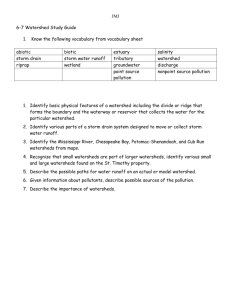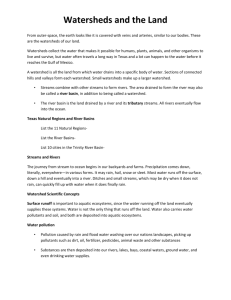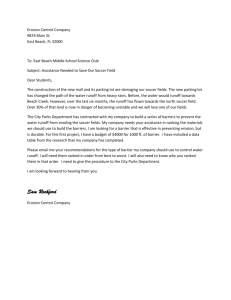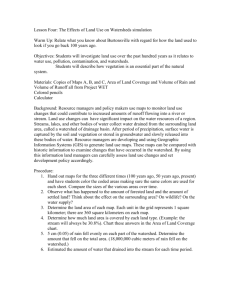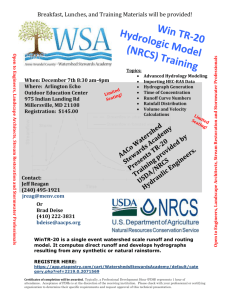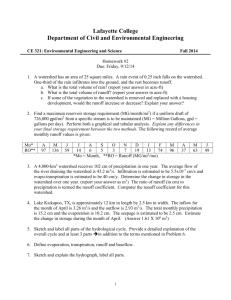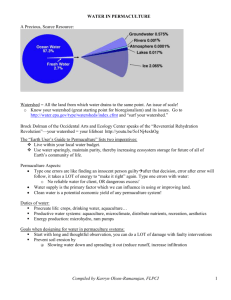Assessing Climate Change Impacts on Belize's Water Resources
advertisement
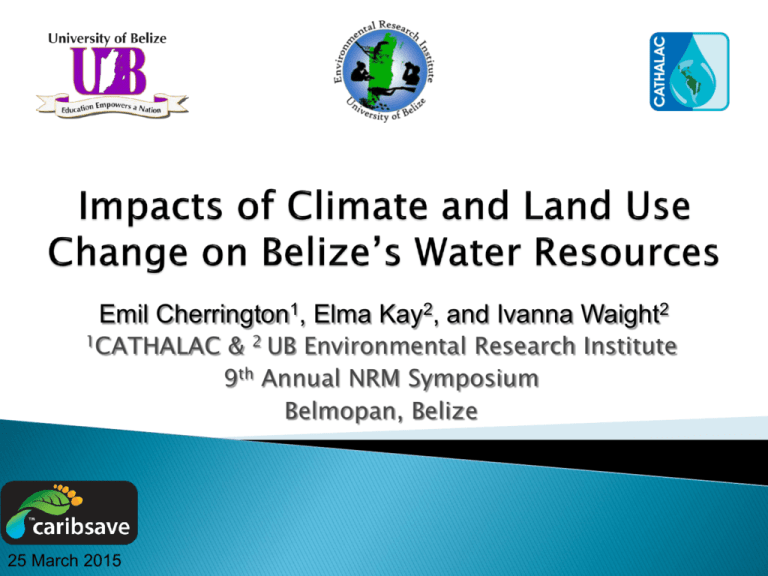
Emil Cherrington1, Elma Kay2, and Ivanna Waight2 1CATHALAC 25 March 2015 & 2 UB Environmental Research Institute 9th Annual NRM Symposium Belmopan, Belize Study Context Goal and Objectives Study Area Methodology Results Conclusions & Recommendations Acknowledgements Central America and Caribbean especially vulnerable to climate change (CC) impacts especially on water resources Regional assessments at a broader scale exist Need for national assessment identified as priority in 2010 National Environmental and Natural Resources Management (NRM) Research Agenda Determine climate and land use change impact on the supply and demand for water in Belize ◦ Estimate the cumulative impacts of climate and land use change on the runoff and erosion components of the hydrological cycle in Belize’s major watersheds ◦ Estimate the impacts of climate change on runoff and erosion ◦ Estimate the impacts of land use change on runoff and erosion ◦ Estimate changes in demand for human consumption Hydrological modeling with Non-Point Source Pollution and Erosion Tool (N-SPECT) DATA TYPE SOURCE RESOLUTION Land Use Belize: Cherrington et al. (2010) Mexico: GlobCover/European Space Agency (2009) Guatemala: INAB (2011) 30 m 300 m Elevation Shuttle Radar Topography Mission (SRTM) 90 m Precipitation Historical norm and IPCC AR-5 RCP scenarios / WorldClim consortium 1,000 m Soil Type FAO Soil & Terrain database of Latin America & the Caribbean (SOTERLAC) 1,000 m 30 m Spatial regression modeling (IDRISI Selva) to assess 3 future land use scenarios based on 2010 land use maps: ‘Business as usual’ scenario (i.e. maintaining 2000-2010 deforestation rate) Deforestation rate halved Deforestation rate doubled 2010 – 2100 but only 2050 used for hydrological modeling IPCC AR5 global climate change models: CNRM-CM5 HadGEM-2 ES MIROC5 MRI-CGCM3 NorESM1-M Used downscaled outputs of these; of all 4 available representative concentration pathways (RCP’s) for these models, only best and worst case scenarios were used (RCP 2.6 and RCP 8.5) Runoff and erosion calculations were run under 4 sets of conditions (44 total runs): Baseline (historical norm): using 2010 land use data and 1950-2000 rainfall average CC and land use change scenarios: using 2050 land use change scenarios and RCP CC scenarios for 2050s CC only scenario: using 2010 land use data in combination with RCP climate change scenarios for 2050s Land use change only scenario: using 2050 land use change scenarios and 1950-2000 rainfall average Estimates of changes in demand for human consumption ◦ Used data from the 2010 LandScan database from the U.S. Oak Ridge National Laboratory (ORNL) to estimate no. of people in project area in 2010 ◦ Projected increase in population ◦ Combined population with average per capita water consumption in Belize estimated at 52.3 m3 (13,816.2 gallons) (MNRA 2010)* Factors water consumption and abstraction losses Results: Land use change modeling a. 2010 (70.6 forest cover) b. 2050, business as usual scenario (54.6% forest cover) c. 2050, deforestation rate halved (69.3% forest cover) d. 2050, deforestation rate doubled (48% forest cover) Results: Rainfall across all watersheds Model Scenario Period (RCP) Baseline 2000 Origin Rainfall (mm) Min WorldClim 1,051 Mean Max % change (mean) 1,750 4,126 N/A CNRM-CM5 2.6 2070 France 1,057 1,711 4,070 -2.2% CNRM-CM5 8.5 2070 France 1,072 1,745 3,991 -0.3% HadGEM2-ES 2.6 2070 UK 983 1,699 4,157 -2.9% HadGEM2-ES 8.5 2070 UK 892 1,496 3,601 -14.5% MIROC5 2.6 2070 Japan 924 1,508 3,603 -13.9% MIROC5 8.5 2070 Japan 993 1,614 3,668 -7.8% MRI-CGCM3 2.6 2070 Japan 924 1,724 4,254 -1.5% MRI-CGCM3 8.5 2070 Japan 815 1,508 3,827 -13.8% NorESM1-M 2.6 2070 Norway 1,076 1,770 4,037 1.1% NorESM1-M 8.5 2070 Norway 851 1,361 3,031 -22.3% Results: Rainfall in specific watersheds Across 3 land use change scenarios, changes in runoff variable and dependent on the climate change scenarios HadGEM-2 ES, MRI-CGCM3, and NorESM1-M models show a reduction in runoff under RCP 8.5, and an increase in runoff under RCP 2.6 The main exceptions to that trend are CNRMCM5, which indicate an overall increase in runoff, and MIROC5, which indicates an overall decrease in runoff By individual watersheds ◦ Northern River watershed is estimated to experience the largest overall increase in runoff ◦ Sittee River watershed is estimated to experience the largest overall decrease in runoff ◦ Belize River watershed, largest watershed in Belize (not taking into account the transboundary sections) as well as the most populated watershed, is overall estimated to experience an increase in runoff. In comparison with estimated changes in runoff, overall tendency is for increased erosion, with a few exceptions ◦ Trend holds irrespective of GCM or RCP Golden Stream watershed estimated to experience the greatest increase in erosion Rio Grande watershed estimated to experience a small decrease in erosion Runoff and climate change only ◦ Overall tendency is a decrease in runoff but under RCP 2.6 for GCMs MRI-CGCM3 and NorESM1-M, there are instances of localized increases in runoff ◦ Few cases where the changes in runoff patterns do not differ much from the historical norm Golden Stream watershed under the RCP 2.6 of the HadGEM-2 ES model North Stann Creek watershed under RCP 8.5 of the CNRM-CM5 model) ◦ South Stann Creek watershed shows most pronounced decrease in runoff across GCMs and RCPs Erosion and climate change only ◦ Erosion also expected to decline across Belize’s major watersheds ◦ Main exception is under RCP 2.6 for MRI-CGCM3, which indicates an increase in erosion in half of Belize’s major watersheds ◦ In other cases, such as RCP 8.5 of the CNRM-CM5 model, RCP 2.6 of the HadGEM-2 ES model, and RCP 2.6 of the NorESM1-M model, the estimated changes in erosion do not differ significantly from the historical norm ◦ Rio Grande watershed would experience the most pronounced decline in erosion across GCMs and RCPs but this is not substantial Runoff and land use change only ◦ Increase in runoff expected across all major watersheds ◦ Changes coincide with changes in deforestation rate ◦ Northern River watershed would experience the largest increase in runoff Erosion and land use change only ◦ Increase in erosion expected across all major watersheds ◦ Rio Grande watershed - no significant change in terms of erosion ◦ Golden Stream watershed – significant increase in erosion, across all land use change scenarios examined Estimates of changes in demand for human consumption ◦ 629,225 people inhabited the project area of interest in 2010, with 48.2% (303,422 persons) inhabiting the mainland Belize segment of the area of interest ◦ For Belize 2010 population = 303,422 and 2050 = 1.017 million ◦ For Belize 2010 demand against supply = 0.073% and 2050 = 0.581 % based on worst case CC and land use change scenario (RCP 8.5 of NorESM1-M) By 2050, less rainfall is expected across Belize’s 16 major watersheds but especially in Northern Belize ◦ Implications for sugar industry or potential displacement of agriculture to South Estimated water demand for human consumption would be 2-8.3X current demand ◦ Estimated supply would be sufficient for human consumption needs but it is imperative we quantify current demand for agricultural and industrial use Declining rainfall and consequent declines in water yield may in turn increase concentrations of sediments in rivers ◦ Rainfall harvesting may be needed if drinking water quality is affected and since it has potential to reduce runoff from flooding Overall, increased deforestation will lead to more erosion, and cause declining water quality ◦ Need to decrease deforestation and increase reforestation in Belize, New River and Rio Hondo watersheds especially Simulating changes in the hydrological cycle based solely on climate change scenarios but in absence of land use change, it would appear that a drier climate under stable land use would actually decrease runoff and erosion Parallel hydrological modeling simulations which take into account land use change but exclude changes in the rainfall regime indicate increases in runoff and erosion (similar to when climate change is also factored in) ◦ Both of the above highlight the importance of land management Approximately 53.7% of the surface area of Belize’s watersheds lie outside of Belize’s national territory, in Mexico and Guatemala ◦ Transnational cooperation with national and municipal governments is needed to address high deforestation especially in Guatemala’s portion of Belize River watershed Scope of the present study is limited ◦ Need to start looking at level of watersheds; quantifying impacts by sector e.g. agriculture, energy etc.; assessment of groundwater resources and cimate and land use impacts on these CARIBSAVE and CDKN Betzy Hernandez supported the conceptualization of this work Dr. Freddy Picado, CATHALAC’s Director General, and Marcelo Oyuela, Miroslava Moran, and Alejandro del Castillo A debt of gratitude is owed to the WorldClim Consortium for making the downscaled climate scenario data free and openly available (www.worldclim.org) Thank You Questions?
